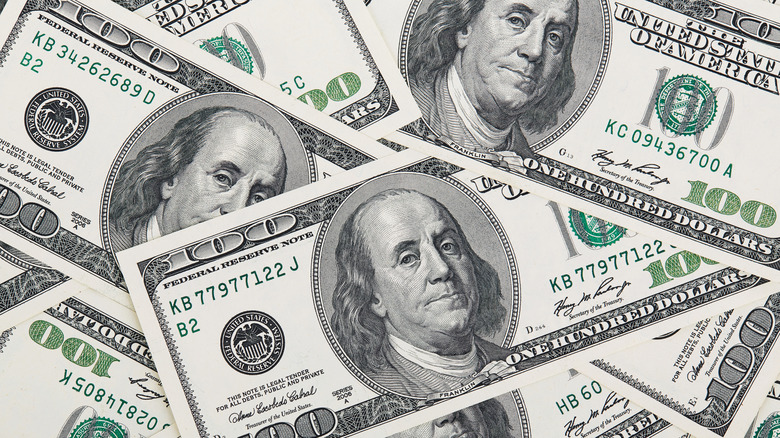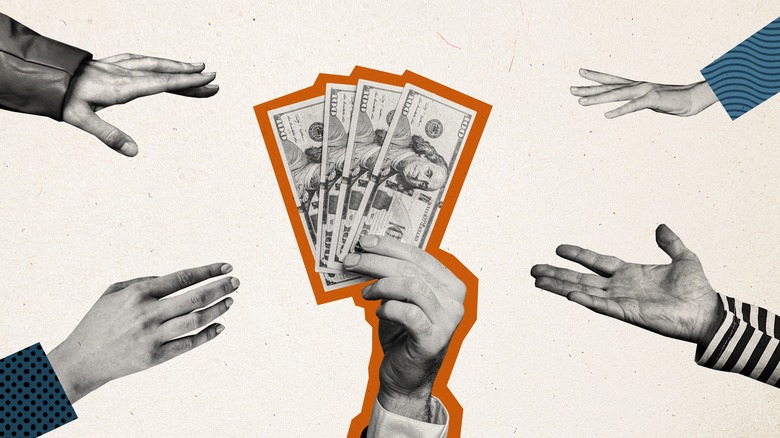What A $5k Per Person Stimulus Would Actually Do To The Economy
Who couldn't use a surprise $5,000? Even though the last economic impact payments — due to the COVID-19 pandemic — were issued back in 2021, the rumors of additional stimulus checks, even for things like student loans, continue to crop up, especially around tax season time. It seems that many consumers can't help hoping for money from above — or, to be more specific, the federal government.
While misinformation and financial desperation are often at the root of most new stimulus check rumors, President Donald Trump and his Department of Government Efficiency head, Elon Musk, continue to add fuel to the fire by floating potential support for so-called DOGE dividend checks. Despite an overwhelming amount of press attention detailing everything from possible check amounts to eligibility requirements for stimulus checks, fact checks on DOGE actually sending out stimulus checks have found that no such dividends are confirmed, whether they be to the tune of $5,000, $500, or even $50.
With that in mind, it's still worth exploring the what if of these checks. If every American did suddenly find themselves $5,000 richer, what would that do for the economy? And, what would DOGE stimulus checks do to the United States Treasury if lawmakers suddenly found themselves having to cough up trillions of dollars to fund such stimulus checks — especially as the current administration has repeatedly stated their goal of slashing trillions of dollars from the already strained federal budget?
The immediate individual benefits
While $5,000 might not be life-changing money to all Americans, it could certainly make life easier for many. Like the economic hardships posed by the COVID-19 pandemic, current times may feel financially precarious. This means low-income consumers, and even those with middle-class level incomes (and beyond), could significantly benefit from an extra $5,000.
Such a windfall could cover a few months of rent in many American cities, and almost two months of an average 30-year fixed mortgage payment. $5,000 could also cover almost seven months of an average new car payment, or about nine and a half months of an average used car payment. This amount could also pay for roughly five months worth of groceries, according to the U.S. Census Bureau, which found that the average American household's monthly spend on groceries was around $1,100 in 2024. And, given the sky-rocketing price of eggs, $5,000 could also pay for 500 $10-per-dozen egg cartons.
A true stimulus check isn't meant to only cover basic bills. However, if people can cover their bottom lines and have money to spare, they're more likely to spend beyond the basics. Freed-up disposable income can lead consumers to either invest or spend in order to stimulate the wider economy. And in times so rocked by the ever-changing nature of Trump's proposed tariffs – along with many Americans still reeling from the cumulative effects of years-long food and energy inflation — the hope of an extra $5,000 to spend however they want might be a hope that dies hard.
Potential long-term negative impacts
The United States has a population of over 341 million people, per March 20, 2025 data from the U.S. Census Bureau. 341 million people each receiving a $5,000 stimulus means that the economy could suddenly see a spending power influx to the tune of over $1.7 trillion dollars. While such a financial easement could pull many Americans temporarily out of poverty, it could also drive up inflation by creating higher demand of production lines that can't keep up with supply.
There is also the matter of funding the $5,000 checks. If the federal government is truly attempting to repair a massive budget deficit, some might question why they would return trillions of supposedly fraudulently spent tax dollars to the people. While Trump and Musk have supported the idea, many Republican representatives have taken issue with the priority, including Speaker of the House, Mike Johnson. Plus, even the architect of the DOGE dividend has said that not everyone should qualify.
If the promise of $5,000 checks are only for "qualifying" households, the social divide between recipients and those denied could also cause a variety of problems. If a stimulus check for the few comes at the expense of everyone losing Social Security benefits under Elon Musk's reign, is such a benefit worth the cost? $5,000 would have immediate impacts for average budgets, but allowing billionaires and millionaires to decide how to award such funds while simultaneously slashing jobs and social infrastructure might simply be mining for fool's gold.


